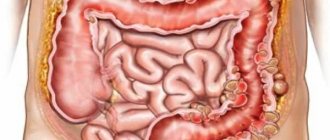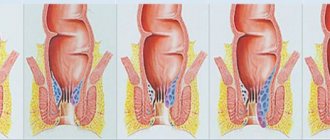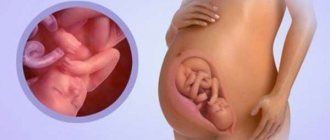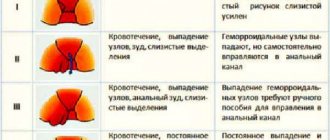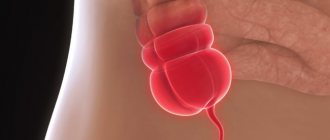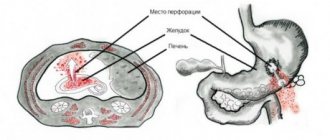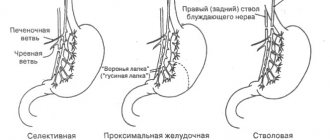About hemorrhoids
Hemorrhoids are varicose veins of the intestine, causing the appearance and inflammation of hemorrhoids.
Manifestations of the disease are internal and external. The pathology causes the expectant mother constant discomfort and unpleasant sensations, which intensify after the act of defecation.
In the early stages, hemorrhoids can be treated with creams, ointments and rectal suppositories.
In more advanced cases, surgical intervention with constant supervision by a specialist is indicated.
Inflammation can occur due to the following factors:
- sedentary, sedentary lifestyle;
- poor nutrition;
- mechanical damage;
- mucosal infection;
- chronic vascular diseases;
- hereditary predisposition.
It is important to notice discomfort in time so that the gynecologist and proctologist can decide on the correct and effective course of treatment.
Do not be afraid to visit a doctor because of the intimacy of this disease. If left untreated, hemorrhoids can cause serious complications.
Is it possible to give birth with hemorrhoids?
The disease cannot affect the health of the fetus, except for increasing the level of stress in the mother due to constant itching and burning.
If the stage is not aggravated, natural birth is possible. Although there are cases when it is necessary to resort to an emergency caesarean section.
Childbirth with hemorrhoids: possible options
Obstetricians and gynecologists do not believe that natural childbirth with hemorrhoids is impossible. Artificial delivery is indicated in cases of chronic form of the disease at the fourth stage of changes. To give birth on her own, a woman will have to intensely strain her abdominal muscles, while the rectal sphincters are involved in the process.
The advancement of the fetus along the birth canal contributes to additional compression of the mother's pelvic vessels. Even previously healthy women in labor experience prolapse of hemorrhoids. If the disease existed previously, then it is necessary to monitor the condition of the nodes and the general well-being of the woman. The midwife manually pushes the fallen nodes back into place.
Caesarean sections due to hemorrhoids are rarely performed. Surgical delivery is necessary in the event of intestinal bleeding or acute thrombosis. The issue is routinely resolved jointly by a proctologist and a gynecologist. The benefits of natural childbirth include:
- lack of effect of anesthesia on the child;
- faster recovery of the uterus.
Women in labor are required to follow the recommendations of obstetricians at the onset of labor. Then it is possible to avoid ruptures of nodes, cracks in the rectum and worsening of hemorrhoids.
Vertical
Vertical childbirth is not a new, but an ancient folk method that allows a woman to stand, move while pushing, lean on the back of a chair, and find the most comfortable position. “Standing” chair designs have been proposed. In the prenatal ward of modern perinatal centers, it is recommended to walk when contractions begin in order to better tolerate pain.
Positive properties are considered:
- relief of the mother's condition with continuous movements;
- the choice of position is determined by the woman herself (on her knees, half-sitting, squatting, standing leaning forward);
- no need for special equipment.
Practitioners consider vertical birth to be optimal and less traumatic for the child. The fetus presses on the lower part of the uterus with its own weight, the cervix opens gradually, the process is perceived less painfully by the mother. It has been proven that the stage of contractions is reduced by 2-3 hours. Oxygen starvation of the baby is excluded.
Obstetricians say that with horizontal childbirth, every fourth woman has to cut the perineum, and with the vertical version, the need arises in 5% of cases.
During the third stage of labor (departure of the placenta), breastfeeding the baby has a positive effect. The placenta comes out quickly, the uterus contracts better.
In the absence of chronic hemorrhoids, rapid childbirth does not cause complications, the nodes are reduced on their own. Contraindications are determined by:
- primarily an inconvenience for obstetricians;
- the impossibility of performing epidural anesthesia (a type of pain relief by introducing special agents into the spinal canal);
- breech presentation of the fetus;
- signs of hypoxia;
- baby's large head;
- premature, rapid labor;
- concomitant diseases of the mother, including severe hemorrhoids.
Doctors are afraid of injuring the baby during rapid contractions.
Horizontal
In practice, the onset of labor occurs vertically, as the woman is advised to move more. Only when the uterus is sufficiently dilated is the woman in labor placed on the table, and the horizontal stage begins. The position is considered traditional, suitable for monitoring the birth canal, the condition of hemorrhoids, and administering medications and anesthetics.
Causes
In pregnant women, pathology occurs for the following reasons:
- with an increase in the concentration of progesterone in the blood, the weakening of muscle tissue and vessel walls increases;
- due to problems with bowel movements. With constipation, a woman is forced to strain hard, which leads to damage to blood vessels in the rectal area;
- During pregnancy, when the baby is large, there may be excessive pressure on the pelvic organs.
During periods of exacerbation of hemorrhoids, it is better to avoid using plain toilet paper. It is recommended to switch to wet wipes that do not contain alcohol or special wet soft toilet paper. Thus, the damaged area will be less injured.
Preventive measures during childbirth
To prevent exacerbation of hemorrhoids, timely measures should be taken to treat it even at the stage of pregnancy planning. For these purposes, it is recommended to do the following.
- Follow the principles of proper nutrition to prevent chronic constipation.
- Maintain physical activity, visit the pool, gym, load your body with feasible sports activities.
- Avoid prolonged sitting.
- Adhere to the rules of personal hygiene.
- Systematically perform exercises to strengthen the muscles of the perineum and sphincter.
Hemorrhoids and childbirth are a very unpleasant and dangerous combination. As prescribed by a doctor, during pregnancy it is allowed to take phlebotropic medications that will strengthen the walls of veins and blood vessels, increase their muscle tone and elasticity, and this reduces the risk of ruptures during natural childbirth.
Put a star:
( 2 ratings, average: 5.00 out of 5)
Save for yourself or share with friends: Save smart! DISCOUNTS FOR EVERYONE up to -90% ON EVERYTHING!
Complications
Otherwise, the pathology may cause:
- tissue infection;
- blood poisoning;
- the appearance of thrombophlebitis;
- necrotization of hemorrhoids;
- development of perirectal abscess;
- pinching of prolapsed formations.
As a result, the mother's general health will deteriorate greatly. There will be a risk of needing surgery during childbirth. Since natural ones will lead to severe pain and the possibility of damaging the mucous membrane of the rectum, followed by death.
During an illness, very often people have the desire to set the prolapsed part of the rectum on their own, but this should not be done.
Such a procedure will lead to damage to the skin, inflammation and, subsequently, blood poisoning.
Causes of hemorrhoids in pregnant women and women in labor
Since varicose veins of hemorrhoidal veins can occur both before pregnancy and within 9 months, as well as during or after labor, there are several reasons for the formation of this pathological process.
Among the most common etiological factors, experts identify the following sources of the problem:
- improperly organized diet, which contributes to difficulties with bowel movements (preference for heavy foods, small amounts of fruits and vegetables);
- a sedentary lifestyle, characteristic of many residents of large cities, and a general lack of mobility;
- genetic predisposition, that is, an innate tendency to form enlarged corpora cavernosa;
- venous insufficiency, which often leads to both varicose veins of the lower extremities and hemorrhoids.
In case of chronicity of the pathological process, women who are planning pregnancy need to discuss treatment tactics with a proctologist even before conception in order to prevent exacerbation of hemorrhoids.
The high probability of developing varicose veins of the anal veins during pregnancy is associated with changes in hormonal balance and the natural physiology of a pregnant woman. Moreover, often the disease practically does not bother the expectant mother, worsening immediately before childbirth.
Factors that provoke inflammation of hemorrhoids in pregnant women are:
- weakening of the tone of smooth muscles and vascular walls, which is caused by an increased content of the hormone progesterone in the body (this is necessary to prevent miscarriage);
- chronic difficulties with bowel movements (associated, among other things, with low gastrointestinal tone), which are accompanied by straining and straining during bowel movements;
- stagnation of blood in the rectum and peritoneum, associated with pressing of the enlarged uterus onto nearby organs;
- low mobility, associated both with a completely objective reason (poor health and weakness), and with ordinary laziness and reluctance to actively move.
Hemorrhoids and childbirth, unfortunately, are quite often related. A woman in labor often discovers inflamed cavernous formations immediately upon delivery or after labor.
Childbirth occurring naturally puts a lot of strain on the pelvic organs. With involuntary contractions of the uterus, pushing and movement of the child along the birth canal, the pressure inside the peritoneum increases sharply, the muscles tense and compress the venous vessels located in the rectum.
As a result, the veins become overfilled with blood and hemorrhoidal nodules appear. In addition, contractions often result in injury to the rectal mucosa and the formation of cracks in the anus. Moreover, the severity of these phenomena largely depends on the duration and severity of labor.
Hemorrhoids and childbirth lead to an exacerbation of the chronic process, in some cases the disease moves to a more severe stage. However, after the birth of the child, the treatment of the pathology becomes somewhat simpler, since some effective medications and surgical interventions become permitted.
The high probability of developing varicose veins of the anal veins during pregnancy is associated with changes in hormonal balance and the natural physiology of a pregnant woman.
Therapy methods
In some cases, medications may not be prescribed due to risks to the health of the fetus. In this case, preventive measures are taken:
- the use of ointments made from natural ingredients;
- use of local medications.
During pregnancy, you can undergo a hemorrhoidal ligation procedure. More serious operations to remove manifestations of the disease are not prescribed. This procedure can only be done after the baby is born.
What are the dangers of hemorrhoids during childbirth and is it possible to give birth with them?
Hemorrhoids that appear for the first time during pregnancy can be treated well with ointments; before the onset of labor, the woman breaks up with it. A significant problem is created by pre-existing chronic hemorrhoids or an acute disease caused by sudden thrombosis of a vessel. The condition of a woman giving birth is determined by the degree of pathological changes.
External nodes are pinched by spasmed muscles, cause severe pain, and bleed when contractions begin. Internal hemorrhoids in stages III–IV are accompanied by severe inflammation, thrombosis of the adductor vessel with necrosis of the wall, and swelling of the external genitalia. The spread of the inflammatory reaction to surrounding tissues with the development of paraproctitis, fistula tracts, and sepsis is a dangerous process for the fetus.
The condition of the mother in labor requires emergency surgical intervention and the prescription of a large dose of antibiotics, which has negative consequences on the health of the child. On the other hand, delay contributes to the passage of infection through the placental barrier and infection of the fetus.
In severe cases, doctors have to decide on the issue of early induction of labor to save the child and the possibility of treating the mother.
In the absence of timely assistance, hemorrhoids during childbirth cause complications:
- heavy bleeding from the nodes;
- infection of the fetus with the spread of inflammation to surrounding tissues;
- strangulation with necrosis;
- thrombophlebitis of the rectal veins.
The risk increases:
- if the child is overweight (4 kg or more);
- with weakness of labor;
- when the woman giving birth is over 40 years old.
Even if the birth goes well, the woman will have to undergo long-term treatment for hemorrhoids.
Indications for natural delivery
Hemorrhoids become a contraindication to natural childbirth only if the course of the disease is aggravated by some factors. In such cases, a caesarean section is prescribed.
If in this condition the natural way of childbearing is not suitable, doctors advise refusing conception until the problem is solved by surgical intervention.
If experts allow a natural procedure, this does not mean that it will be completely painless.
How to give birth with hemorrhoids
It all depends on the professionalism of the obstetricians, who will provide moral and physical support. It is important for a mother in labor to be prepared for the fact that pain during the birth of the baby will increase significantly.
Indications for natural childbirth may include:
- normal course of the disease without prolapse of large nodes;
- absence of frequent bleeding and urge to go to the toilet;
- any non-aggravated form of development (except for the 4th stage);
- absence of possible complications that would complicate delivery.
At any moment, the mother can report unpleasant and painful sensations. In this case, surgical intervention by a surgeon will occur.
Exacerbation of hemorrhoids and delivery by cesarean section
Delivery by cesarean section with hemorrhoids is rare. The need for surgery is caused by complications.
To avoid the need for a cesarean section, a woman must adhere to the rules before pregnancy and during it:
- Follow your doctor's instructions.
- Monitor the course of the disease and treat any exacerbation that occurs.
- Eat right, on schedule.
- Moderate physical activity.
C-section
When is a caesarean section indicated?
Indications for caesarean section for acute hemorrhoids:
- 4 clinical stage of the disease.
- Acute thrombosis of venous nodes.
- Severe hemorrhoidal bleeding.
- The addition of a secondary infection, the occurrence of purulent complications.
Advantages of cesarean section for hemorrhoids
Caesarean section has a number of advantages over physiological childbirth.
When performing surgical delivery, the increased load on the abdominal and pelvic organs is eliminated. Those who have undergone surgery avoid exacerbation of hemorrhoids. Feedback from mothers in labor about undergoing surgery indicates fewer complications after childbirth.
Complications after caesarean section
Complications develop in the postoperative period. Associated with the appearance of constipation, stagnation of venous blood in the pelvis. Rules for preventing complications:
- While in bed after surgery, lie with your pelvic area elevated. Improves the outflow of venous blood from the pelvis.
- To prevent the hemorrhoid from protruding, it is necessary to prevent the occurrence of constipation.
Is caesarean section possible and in what cases?
Are hemorrhoids dangerous during childbirth? Only if the hemorrhoids are severely inflamed, heavy bleeding is present. In such a situation, natural childbirth is out of the question.
In such a case, the pain will be so severe that the woman may lose consciousness or even die from painful shock.
Additional contraindications to natural childbirth may include the following:
- Separation of the pubic bones.
- Large fruit.
- Tumors, fibroids in the uterine area.
- Unnatural location of the placenta.
- Transverse position of the baby in the womb.
- Malignant neoplasms.
Labor activity
It is allowed to give birth with inflamed hemorrhoids naturally if there are no serious complications. The choice of method for the birth of a baby depends on the nature of the disease, the woman’s well-being and the medical indications of the gynecologist or proctologist.
Natural birth
Naturally occurring childbirth with hemorrhoids is safe for the health of the child, but can pose a threat to the woman’s well-being. Inflammation of the anal nodes affects the duration of the process, an increase in the pain threshold, loss of cones as a result of muscle strain and stress on the blood vessels. Pinching due to untimely return of the bumps to their place after a change in position leads to the progression of the pathology.
To avoid serious consequences if hemorrhoids worsen during childbirth, you need to follow the correct behavior on the advice of obstetricians and a doctor when pushing and not strain your muscles during breaks between contractions.
C-section
Childbirth with hemorrhoids is a safe process if there were no disease complications during pregnancy, and the symptoms of the pathology were reduced using medications and folk methods.
The reasons for prescribing a caesarean section are:
- Stage 4 of hemorrhoid development – prolapse of nodes without the possibility of self-reduction into the anus;
- thrombosis;
- tissue necrosis;
- entry of infection, pathogenic bacteria through the inflamed areas of the anus;
- non-stop anal bleeding.
Experts recommend giving birth to hemorrhoids without surgery for a woman’s quick recovery. The advantages of using a cesarean section are the absence of pressure on the muscular system, eliminating the risk of prolapse and pinching of inflamed lumps. The dangers posed after surgical intervention during labor are the progression of hemorrhoids after surgery due to the recommended bed rest, constipation, and disruption of the functioning of the gastrointestinal tract.
Treatment of hemorrhoids after childbirth
It is necessary to get rid of such a disease, otherwise it will accompany a person until his death, constantly becoming inflamed and bringing unbearable pain. There are two methods of prevention:
- Surgical.
- Alternative.
In the first case, you need to sign up for an operation, during which the inflamed area of the mucous membrane will be removed. However, some alternative treatment methods will still need to be used for rehabilitation purposes and to prevent recurrence.
The second method is to use natural ingredients and special ointments. In this case, a light diet is recommended, in which bowel movements will not cause pain.
Author: Maxim Dmitrievich, obstetrician-gynecologist Specially for the site kakrodit.ru

